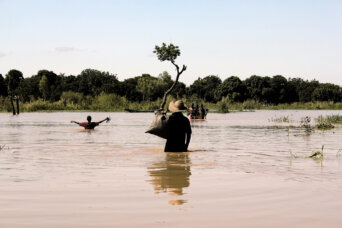- About
- Topics
- Picks
- Audio
- Story
- In-Depth
- Opinion
- News
- Donate
- Signup for our newsletterOur Editors' Best Picks.Send
Read, Debate: Engage.
| topic: | Conservation |
|---|---|
| located: | Nigeria |
| editor: | Ekpali Saint |
One morning in March, Eunice Nnachi and other residents of the Obogoro community of Nigeria’s Bayelsa state marched to the press centre to speak about the continual disaster of coastline erosion. This has become a significant environmental and socio-economic issue in the Niger Delta - a region with one of the world’s largest wetland ecosystems - whose coastlines are disappearing.
Nnachi, along with a group of women who are involved in a women’s rights organisation she leads, declared that they marched “in solidarity with the woman that died last November.” They are referring to one of the community’s women whose house was carried away at night while she was sleeping. Her body has not yet been found.
Nnachi herself has been affected by the erosion. Already, she has had to abandon her house and other ones she rented out. While her tenants have all moved away, she’s currently squatting in her office and hoping to raise 200,000 naira (€398) to rent an apartment.
Nnachi is not alone. The people in Obogoro community say they have lost about 60 percent of their homeland due the coastline erosion, caused by the removal of protective bedrock from the shoreline.
Alagoa Morris, a Yenagoa-based project officer with Environmental Rights Action/ Friends of the Earth Nigeria (ERA/FoEN), explained that there are different reasons coastal erosion occurs in the state, one of which is the annual flooding which displaced 700,000 people in Bayelsa State last year alone.
According to the World Bank, the total cost of erosion in Nigeria’s states of Cross River, Delta and Lagos was estimated at $1.9 billion or 1.6 percent of their combined gross domestic product (GDP), in 2018.
Morris said these communities are in need of shoreline protection, which involves the construction of structures to slow the rate of erosion. However, Morris explains that this is just a temporary solution and that the government must show commitment and prioritise the project to protect the communities in the long term.
That is why to him, the people’s march was important to remind the government that “more houses have been washed into the river, people have died, people are apprehensive [and] are suffering.”
Meanwhile, Nnachi hopes the government will swing into action immediately before the rainy season. “We want the government to hear us,” she pleaded. “If rain starts, they won’t be able to do anything.”
Image by Immanuel Afolabi

